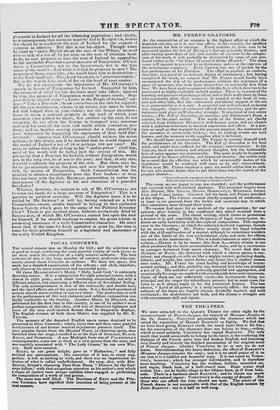MR. PERRY'S ORATORIO.
As the composition of an oratorio is the highest effort at which the musician can aim, so it is one that offers, in this country, the smallest inducement for him to attempt. Every oratorio is, here, sure to be measured against the few of HANDEL'S that are generally known; and after having spent days of toil and mouths of exertion in the conspire. tion of his work, it will probably he discovered by some of our pros found critics to be " fur below IIANDEL'a divine tliessioh." The same eattse will operate to prevent its performance, unless at the expense of the unfortunate composer. Even Cm:atm was out of pocket by the last performance of his Pakstine. The effort to produce an oratorio, therefore, is a proof of no ordinary degree of enthusiasm ; but, having completed his work, we suspect that Mr. PERRY would hardly have encountered the risk of its performance without the assistance of a party of amateurs, who took upon themselves to indemnify him from loss. We have been made acquainted with this fact, which deserves to be mentioned as highly creditable to both parties. There is so much of the humbug and pretence of patronage afloat, and FO little really done by those who commonly allow their names to he paraded at the head of con- cert and other bills, that this substantial and liberal support of the art is as praiseworthy as it is rare. A powerful and well-selected orchestra was engaged ; singers of eminence offered their services ; and the per- formance took place on Wednesday sennight. It consisted of two entire works,— The Fall of Jerusalem, an oratorio ; and Belshazzar's Feast, a cantata, by the same author. The words of the former are chiefly selected from Professor Mtastae's well-known poem, and are chosen with a judicious reference to musical expression and effect. In a por- tion so small as that required for the present purpose, the connexion of the narrative is necessarily broken ; but its leading events are well known, and the memory easily supplies what is deficient. We should have recommended Mr. PERRY to content himself with the performance of his Oratorio. The Fall of Jerusalem is his best work, and might have sufficed for the evening's entertainment. In his Cantata, there are striking and original thoughts, but the fashionable love of noise appears too prominently. The score might be frequently divested of its brazen addenda, and improved thereby : the author may be assured that the effective use which he occasionally makes of his trombones would be rendered still more so by this retrenchment. When next Mr. PERRY employs a poet, we would advise him to seek for one who knows better than to put these lines into the mouth of the prophet Daniel- "Tem with meek repentance to the throne of grace,
And In.k forgiveness through a Saviour's love!"
The room, we are happy to say, was crowded ; and the performance- was received with well-merited applause. The principal singers were Nirs. BISHOP, MPS. SEGUIN, Messrs. HORNCASTLE, ROBINSON, LEONI LEE, and PARRY junior. CRAMER led the band, and PERRY presided at the Organ. The Chorus seemed chiefly composed of amateurs,— at least so we guessed, from the feeble and uncertain way in which they sometimes went through their work.
. We cannot find space for an analysis of the composition; but oar opinion, after hearing it, has confirmed that which resulted from &- perusal of the score. The choral writing, which forms so prominent.
a feature in it, and especially the frequency of fugal counterpoint, in- dicate an early familiarity with this style of composition. This appears
even in the Overture ; of which the subject is bold and vigorous, though by no means trifling. Mr. PERRY usually treats his fugal subjects with the skill and freedom of a master, although he sometimes wanders out of the limits of the true ecclesiastical style, and rests his effects- too much on his instruments. This is a fault common to many modern writers,—HAYDN is by no means free from it,--whose climax is too often produced by the mere accumulation of noise, and by a recurrence • to passages borrowed from opera choruses. We never find this its HANDEL or BACH : the character with which a chorus opens, is sus-
tained, not changed—it rolls on like a mighty torrent, gathering depth,
fulness, and weight, but never dashes and foams like a shallow streas over rocks. Mr. PERRY has great facility and knowledge of instru-
mental writing; and this, probably, has betrayed him into too prodigal,
a use of it. His melodies are generally graceful and appropriate, and occasionally his songs are marked with considerable force and expression.
Sotne of them are not sufficiently vocal—the instruments being the principal and the singer the subordinate person ; but in most cases the. voice is, as it always ought to be, the prominent feature. The last chores, " Lord of all power," is a truly masterly effort: the separate subjects of the fugue are happily chosen, decidedly marked, and well contrasted; the modulations are bold, and the climax is wrought out with consummate skill and vigour.


























 Previous page
Previous page